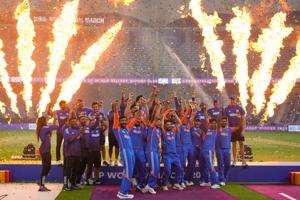India’s victory over Pakistan in the Asia Cup final on October 1, 2023, was overshadowed by a significant diplomatic tension that erupted during the trophy presentation ceremony. The Indian cricket team, having secured their ninth Asia Cup title, refused to accept the trophy from a senior Pakistani official, escalating already strained relations on and off the field.
Tilak Varma’s impressive half-century led India to a decisive win at the Dubai International Cricket Stadium. However, it was the post-match ceremony that drew the most attention. Initially delayed for over one-and-a-half hours, the ceremony was further complicated when the Indian team declined to accept the trophy from Mohsin Naqvi, the chief of the Asian Cricket Council (ACC) and the Pakistan Cricket Board (PCB). The refusal was consistent with the Indian team’s earlier decision to forgo handshakes with their rivals throughout the tournament.
In the aftermath of the match, Indian Twenty20 captain Suryakumar Yadav expressed frustration over the situation, stating, “This is one thing which I have never seen since I started playing cricket… a champion team is denied a trophy, that too a hard-earned one.” He emphasized that despite the trophy’s absence, the team’s accomplishments were what truly mattered.
A statement from the ACC prior to the ceremony indicated that Naqvi would present the trophy to the winners. However, the Indian team’s refusal to receive it from him led to a tense atmosphere. An official removed the Asia Cup trophy from the presentation podium without explanation. As former New Zealand cricketer Simon Doull announced the team’s withdrawal from the ceremony, individual awards were still presented to Indian players, who accepted them from sponsor representatives without acknowledging Naqvi.
The Pakistani team, led by captain Salman Agha, received their runners-up medals from Aminul Islam, president of the Bangladesh Cricket Board, amid the unfolding drama. Agha condemned India’s actions, stating, “Good teams don’t do what they did today… they’ve been very disrespectful.” He highlighted that the behavior displayed by the Indian team sent a poor message to the youth of both countries, emphasizing the importance of sportsmanship.
India’s Board of Control for Cricket in India (BCCI) secretary Devajit Saikia confirmed the team’s decision not to accept the trophy from Naqvi, labeling the situation unfortunate. He stated, “We hope that the trophy and the medals will be returned to India as soon as possible,” and indicated that the BCCI would lodge a formal protest during the upcoming ICC conference in November.
This Asia Cup marked a rare resumption of cricketing ties between India and Pakistan, occurring just months after heightened tensions along their shared border impacted other cricketing events. Throughout the tournament, incidents such as the handshake controversy highlighted the fragile state of relations, with Pakistan even threatening to withdraw from the competition over the issue.
As cricket fans and officials look towards the future, the implications of this incident resonate far beyond the cricket field, affecting diplomatic relations between two of the world’s most populous nations. This unfolding drama serves as a reminder of how sports can reflect broader societal issues, and the hope remains that future encounters may foster a spirit of cooperation and respect.
